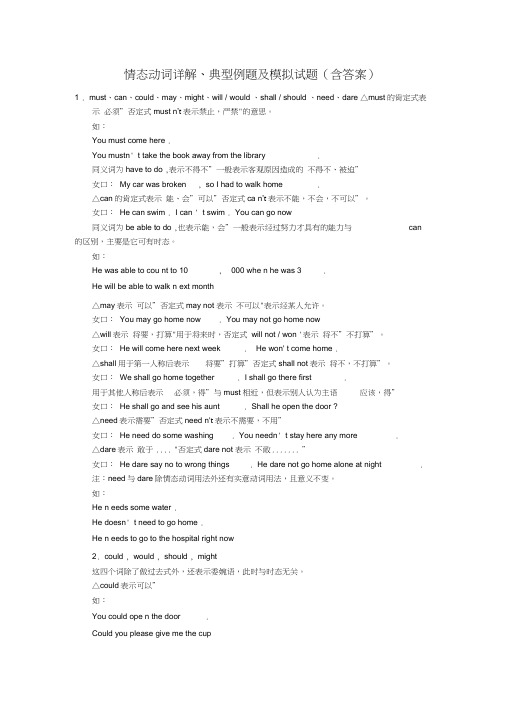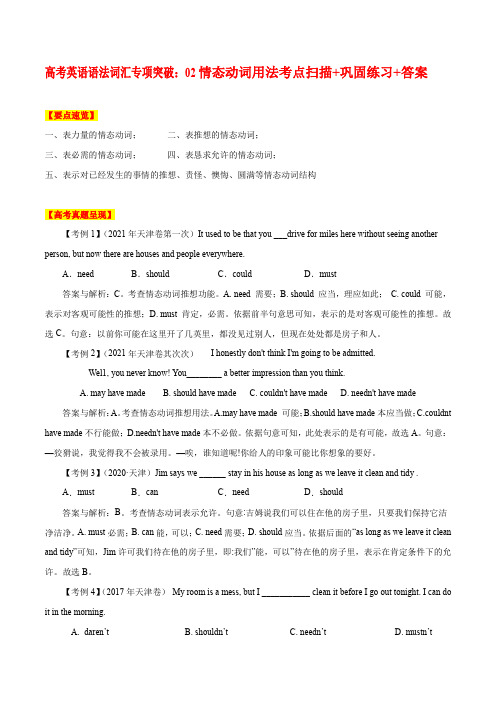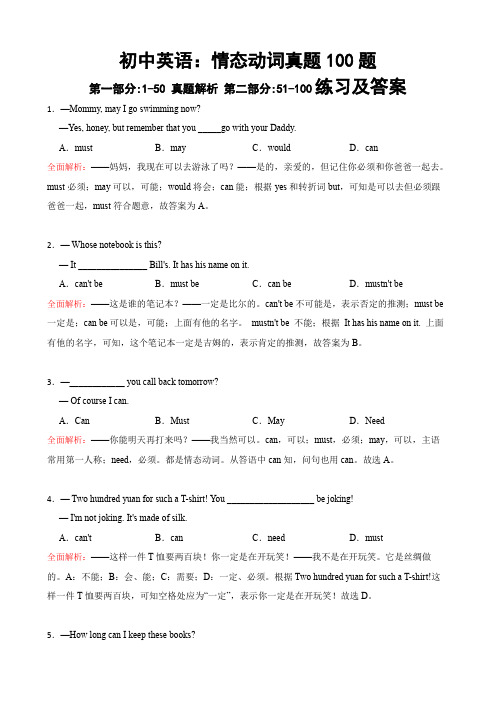情态动词专项讲解及练习
(完整)英语语法 情态动词及练习题

情态动词一、知识梳理/提炼1. can和could的用法表示能力或客观可能性,还可以表示请求和允许。
如:Can you finish this work tonight?Man cannot live without air.— Can I go now?— Yes, you can.注意:①could也可表示请求,语气委婉,主要用于疑问句,不可用于肯定句,答语应用can (即could不能用于现在时态的简略答语中)。
如:Could I come to see you tomorrow?Yes, you can。
(否定答语可用No, I'm afraid not。
)②can表示能力时,还可用be able to代替。
如:I'll not be able to come this afternoon。
2。
may和might的用法1)表示许可.表示请求、允许时,might比may的语气更委婉一些,否定回答时要用mustn't表示“不可以"、“禁止"、“阻止”之意.如:You may drive the car.— Might I use your pen? — No,you can’t/ mustn't. Yes, you can/may. 用May I .。
. 征询对方许可在文体上比较正式,在口气上比较客气。
在日常口语中,用CanI ... 征询对方意见在现代口语中更为常见.2) 用于祈使句中表示祝愿.如:祝你成功! May you succeed!3)表示推测、可能(疑问句不能用于此意)。
他现在可能很忙. He may be very busy now。
3。
must和have to的用法1) 表示必须、必要。
如:You must come in time.回答must引出的问句时,如果是否定的回答,不能用mustn't,而要用needn't或don't have to。
小学专项练习题情态动词的用法练习及

小学专项练习题情态动词的用法练习及小学专项练习题情态动词的用法练习及解析情态动词是英语中一个非常重要的语法结构,它们不仅可以表达说话者的意愿、推测、建议等情感,而且可以用来强调特定的观点、态度和描述,因此是学习英语时必须掌握的一部分。
本文将为大家介绍小学阶段常见的情态动词,并提供一些练习题供大家练习。
1. Can和Could的用法Can和Could均可以表示能力、许可和请求,但它们用法略有不同,Can常用于肯定句,Could常用于疑问句或询问礼貌。
例如:1)I can swim in the pool.(我能在游泳池里游泳。
)2)Could you help me with my homework?(你能帮我做作业吗?)练习题:用Can或Could填空1)_____ you pass me the salt, please?(能把盐递给我吗?)2)I _____ play the piano when I was three years old.(我三岁时就能弹钢琴。
)3)_____ I borrow your pen for a moment, please?(我能借下你的笔吗?)4)My sister _____ draw a picture very well.(我妹妹会很好地画画。
)答案:1)Could;2)Could;3)Can;4)Can2. Should和Must的用法Should表示建议或期望,而must表示强制和义务。
例如:1)You should brush your teeth twice a day.(你应该一天刷两次牙。
)2)You must wear a seatbelt in the car.(你必须在车上系安全带。
)练习题:用should或must填空1)You _____ finish your homework before watching TV.(你在看电视之前必须完成作业。
情态动词的用法及练习(附答案)

情态动词的用法及专项练习第1 & 2类:词形词的含义例句can ①“能力”②“允许”③“可能性”(0%)④“请求”I can speak English.Can I go to the toilet.It can’t be Susan. She is in Paris. Can you help me?could ①“过去的能力”②“过去的允许”③“可能性”(30%)④“请求”, 比can更客气⑤“建议”⑥“将来的一种可能性”She could speak English When she was 5 years old. Could I borrow your dictionary?It could get much colder in January.Could you please say that again more slowly.We could try to fix it ourselves.I think we could go to war again.be able to “能力”= can, 但比can的时态更具多样性。
can无法表达的时态,用be able to表达。
She will be able to teach English. (一般将来时)She was able to talk when she was 2 years old. (一般过去时)I would love to be able to play the piano. (动词不定式)may ①“请求、允许”(比较礼貌)②“将来的可能性”(50%)③may 在更多的时态中经常May I come in?It may rain tomorrow.第1类:十大情态动词can / could / may / might / must / ought to / shall / should / will / would 第2类:半情态词及充当情态动词的词had better / be able to / have to / used to / need / dare用be allowed to来代替might “较小的可能性”(≤30%)I might move to Canada some day.must ①“必须”(责任、义务)②“可能性”(推测) (100%)③“禁止”(否定式) Everyone must pay taxes.She didn’t arrive. She must be sick.You mustn’t p l ay with fire. It’s dangerous.have to ①“必须、不得不”(客观上不得不做)②多种时态里面代替“must”,因must只有一般现在,但have to 可以有多种时态。
情态动词详解、典型例题及模拟试题(含答案)教学文案

情态动词详解、典型例题及模拟试题(含答案)1 . must、can、could、may、might、will / would 、shall / should 、need、dare △must的肯定式表示必须”否定式must n't表示禁止,严禁"的意思。
如:You must come here .You mustn' t take the book away from the library .同义词为have to do ,表示不得不”一般表示客观原因造成的不得不、被迫”女口:My car was broken , so I had to walk home .△can的肯定式表示能、会”可以”否定式ca n't表示不能,不会,不可以”。
女口:He can swim . I can ' t swim . You can go now同义词为be able to do ,也表示能,会”一般表示经过努力才具有的能力与can 的区别,主要是它可有时态。
如:He was able to cou nt to 10 , 000 whe n he was 3 .He will be able to walk n ext month△may表示可以”否定式may not 表示不可以"表示经某人允许。
女口:You may go home now . You may not go home now△will表示将要,打算"用于将来时,否定式will not / won '表示将不”不打算”。
女口:He will come here next week . He won' t come home .△shall用于第一人称后表示将要”打算”否定式shall not表示将不,不打算”。
女口:We shall go home together . I shall go there first .用于其他人称后表示必须,得”与must相近,但表示别人认为主语应该,得”女口:He shall go and see his aunt . Shall he open the door ?△need表示需要”否定式need n't表示不需要,不用”女口:He need do some washing . You needn' t stay here any more .△dare表示敢于.... "否定式dare not 表示不敢....... ”女口:He dare say no to wrong things . He dare not go home alone at night .注:need与dare除情态动词用法外还有实意动词用法,且意义不变。
情态动词讲解,练习题和答案(最新整理)

一、情态动词主要用来表示说话人的看法、态度等1. can (could)1) 表示能力,could主要指过去时间。
例如:① Two eyes can see more than one. 两只眼比一只眼看得清。
② Could the girl read before she went to school? 这女孩上学前能识字吗?因为can不能和其他助动词连用,所以表示将来式时用will be able to例:You will be able to skate after you have practiced it two or three times.注意:Can表示一贯的能力,be able to表示客观能力和通过努力可以达到的能力I can’t swim. But I am sure I will be able to swim through more practicing.The fire spread through the hotel, but everyone was able to get out2) 表示允许。
例如:① Can I have a look at your new pen? 我可以看一看你的新钢笔吗?② He asked whether he could take the book out of the reading—room. 他问他可不可以把书带出阅览室。
3) 表惊异、怀疑、不相信等态度。
主要用于否定句、疑问句或感叹句中。
例如:① Where can (could) they have gone to? 他们会去哪儿了呢?② How can you be so careless? 你怎么这么粗心?4) 比较委婉客气地提出问题或陈述看法。
例如:① Can (Could) you lend me a hand? 帮我一把好吗?.② I’m afraid we couldn’t give you an answer today. 恐怕我们今天不能给你答复。
高考英语语法词汇专项突破:02情态动词用法考点扫描+巩固练习+答案

高考英语语法词汇专项突破:02情态动词用法考点扫描+巩固练习+答案【要点速览】一、表力量的情态动词;二、表推想的情态动词;三、表必需的情态动词;四、表恳求允许的情态动词;五、表示对已经发生的事情的推想、责怪、懊悔、圆满等情态动词结构【高考真题呈现】【考例1】(2021年天津卷第一次)It used to be that you ___drive for miles here without seeing another person, but now there are houses and people everywhere.A.need B.should C.could D.must答案与解析:C。
考查情态动词推想功能。
A. need 需要;B. should 应当,理应如此;C. could 可能,表示对客观可能性的推想;D. must 肯定,必需。
依据前半句意思可知,表示的是对客观可能性的推想。
故选C。
句意:以前你可能在这里开了几英里,都没见过别人,但现在处处都是房子和人。
【考例2】(2021年天津卷其次次)---I honestly don't think I'm going to be admitted.---Wel1, you never know! You________ a better impression than you think.A. may have madeB. should have madeC. couldn't have madeD. needn't have made答案与解析:A。
考查情态动词推想用法。
A.may have made 可能;B.should have made本应当做;C.couldnt have made不行能做;D.needn't have made本不必做。
依据句意可知,此处表示的是有可能,故选A。
大学英语情态动词完整详细版附练习题

大学英语情态动词完整详细版附练习题情态动词概述情态动词是英语中一类特殊的动词,用于表达说话人的意愿、能力、推测、建议、许可等。
常见的情态动词有 "can"、"could"、"may"、"might"、"shall"、"should"、"will"、"would"、"must" 等。
以下是对每个情态动词的详细解释和用法:1. Can 表示能力、许可或请求。
例如:Can表示能力、许可或请求。
例如:- I can swim.(我会游泳。
)- Can I use your pen?(我可以用你的钢笔吗?)2. Could 过去式形式的 "can",表示能力、请求或礼貌的请求。
例如:Could过去式形式的"can",表示能力、请求或礼貌的请求。
例如:- I could ride a bike when I was five.(我五岁时就会骑自行车了。
)- Could you please open the window?(可以请你打开窗户吗?)3. May 表示许可或推测。
例如:May表示许可或推测。
例如:- May I go to the bathroom?(我可以去洗手间吗?)- It may rain tomorrow.(明天可能会下雨。
)4. Might 过去式形式的"may",表示推测或可能性较小。
例如:Might过去式形式的 "may",表示推测或可能性较小。
例如:- I thought it might be too late.(我想可能太晚了。
)5. Shall 表示将来时态的意愿、建议或命令。
例如:Shall表示将来时态的意愿、建议或命令。
100例全面解析初中英语情态动词专项练习与答案

初中英语:情态动词真题100题第一部分:1-50 真题解析第二部分:51-100练习及答案1.—Mommy, may I go swimming now?—Yes, honey, but remember that you _____go with your Daddy.A.must B.may C.would D.can全面解析:——妈妈,我现在可以去游泳了吗?——是的,亲爱的,但记住你必须和你爸爸一起去。
must必须;may可以,可能;would将会;can能;根据yes和转折词but,可知是可以去但必须跟爸爸一起,must符合题意,故答案为A。
2.— Whose notebook is this?— It _______________ Bill's. It has his name on it.A.can't be B.must be C.can be D.mustn't be全面解析:——这是谁的笔记本?——一定是比尔的。
can't be不可能是,表示否定的推测;must be 一定是;can be可以是,可能;上面有他的名字。
mustn't be 不能;根据It has his name on it. 上面有他的名字,可知,这个笔记本一定是吉姆的,表示肯定的推测,故答案为B。
3.—____________ you call back tomorrow?— Of course I can.A.Can B.Must C.May D.Need全面解析:——你能明天再打来吗?——我当然可以。
can,可以;must,必须;may,可以,主语常用第一人称;need,必须。
都是情态动词。
从答语中can知,问句也用can。
故选A。
4.— Two hundred yuan for such a T-shirt! You ___________________ be joking!— I'm not joking. It's made of silk.A.can't B.can C.need D.must全面解析:——这样一件T恤要两百块!你一定是在开玩笑!——我不是在开玩笑。
- 1、下载文档前请自行甄别文档内容的完整性,平台不提供额外的编辑、内容补充、找答案等附加服务。
- 2、"仅部分预览"的文档,不可在线预览部分如存在完整性等问题,可反馈申请退款(可完整预览的文档不适用该条件!)。
- 3、如文档侵犯您的权益,请联系客服反馈,我们会尽快为您处理(人工客服工作时间:9:00-18:30)。
情态动词专项讲解及练习一、初中英语情态动词1.—Mum, I play football this afternoon?—Sure, but you finish your homework first.A. may; couldB. can; mustC. can; mustn'tD. may; can't【答案】 B【解析】【分析】句意:-妈妈,今天下午我能踢足球吗?-当然,但是你必须先完成作业。
前句提请求,can,may都可以;后句,由sure可知后句用肯定回答。
Could表示一种委婉的语气;must表示主观愿望:必须。
妈妈要求孩子“必须”先完成作业。
故选B。
【点评】考查情态动词辨析,may表示请求时候的回答用语。
2.According to the law, traffic keep to the left in England.A. mayB. mustC. needD. can【答案】 B【解析】【分析】句意:根据法律规定,在英国车辆必须靠左形式。
A.may可以,表示允许;B.must必须,表示要求;C.need需要,表示必要性;D.can能,表示能力。
根据According to the law,可知法律的要求,应是必须的,应用must,故答案为B。
【点评】考查情态动词。
掌握情态动词的常用法。
3.— __________I wear a tie to Janet's birthday party?— No,you needn't. But do remember to bring her a present.A. MustB. ShouldC. NeedD. Can【答案】 A【解析】【分析】句意:——我必须戴领带去参加Jane的生日聚会吗?——不,你不必,但是记住给她带个礼物。
对于must的否定回答是用needn't。
而should应该;need需要;can可以。
所以根据回答可知选A。
【点评】考查情态动词的基本用法。
4.—Shall we meet at the station at 9 a.m.?—In fact we ______. The train ______until 11a.m.A. needn't; will leaveB. needn't; won't leaveC. mustn't; leavesD. mustn't; doesn't leave【答案】 B【解析】【分析】句意:—我们上午9点在车站见面好吗?—事实上我们不需要。
火车直到11点才离开。
needn't情态动词,不需要,没必要;mustn't情态动词,不允许,语气强烈,本题含义只是“不需要”,并没有“禁止、不许”这样强烈的语义。
not...until...,意为“直到...才...”,表示将来发生的事情,所以使用一般将来时态的否定形式won't。
故选:B。
【点评】考查情态动词辨析,固定搭配not...until...。
一般将来时态。
5.— Is this e-dictionary Jack's?— No, it_______ his. His is much newer.A. can't beB. mustn't beC. may beD. should be【答案】 A【解析】【分析】句意:-这个电子字典是杰克的吗?--不可能是他的,他的更新些。
must,can(could),may(maight)可以表示猜测,must表示肯定猜测,用于肯定句,肯定……,一定……;can’t,表示否定猜测,肯定不……,另外can(could),may(maight),表示可能性猜测,可能……。
根据后文的依据,可知是否定猜测,故选A6.The girl riding a horse there be Shirley. Her left leg was badly hurt in an accident yesterday.A. needn'tB. may notC. can'tD. mustn't【答案】C【解析】【分析】句意:那边骑马的女孩不可能是雪莉。
她的左腿在昨天的事故中受了重伤。
A.needn't不必;B. may not不可以;C. can't不可能,表示否定的推测;D. mustn't 不准,不允许,表示禁止。
本题表示否定的推测,不可能:can't。
故选C。
7.Rock music ______ sound popular with the young, but it's not the favor of the aged people.A. mustB. needC. shouldD. may【答案】 D【解析】【分析】句意:摇滚音乐在年轻人中听起来受欢迎,但是它不受上了年龄的人的赞同。
must, 表示猜测时,指把握比较大的肯定猜测,肯定……;need需要;should,应该;may,表示把握比较小的肯定猜测,可能,也许。
结合句意,故选D。
【点评】考查情态动词辨析,注意几个常见情态动词的意思和用法。
8.—How amazing this robot is!—Wow, it has video cameras in its eyes, so it “see” and interact with people.A. mayB. canC. mustD. should【答案】 B【解析】【分析】句意:—这个机器人多么惊人啊!—哇,在它的眼睛里有摄像机,因此它能看见和人打交道。
A. may 可以,可能;表示许可,B. can 能;表示能力,C. must 必须;D. should应该;根据it has video cameras in its eyes,可知是有能力看见,故选B。
【点评】考查情态动词辨析。
熟记情态动词的含义和用法。
9.— We've ordered too much food. I eat any more.—Never mind. Let' take it home.A. can'tB. mustn'tC. needn'tD. shouldn't【答案】 A【解析】【分析】句意:——我们已经点了太多的食物,我不能再吃了。
——没关系,我们带回家吧。
can't不能;mustn't必须不;一定不要;needn't不必;shouldn't不应该。
根据句意可知选A。
【点评】考查情态动词辨析。
10.He _________ work on the farm every day. I'm sure about that because his skin is very black.A. can'tB. mayC. mustD. couldn't【答案】 C【解析】【分析】句意:他一定每天在农场工作,我敢肯定,因为他的皮肤很黑。
A. can't不可能,对事情表示否定推测;B. may可以,可能;C. must一定、必须,表示非常肯定的推测;D. couldn't不能。
根据I'm sure about that because his skin is very black.可知他是在农场上工作,此处表示肯定的推测,故选C。
【点评】此题考查情态动词。
要掌握每个情态动词的使用方法。
11.—Look! The woman at the school gate ______be her headmaster.—No, it ______ be her. She is holding a meeting in the office now.A. must; can'tB. must; mustn'tC. can; needn'tD. may; mustn't【答案】 A【解析】【分析】句意:——看!学校门口的那个妇女一定是她的校长。
——不,不可能是她。
第一空,must表示“一定”;空二,根据She is holding a meeting in the office now. 她现在正在办公室开会,可知,不可能是校长,用can't,表示不可能。
故选A。
【点评】考查情态动词辨析。
注意不同情态动词的用法,注意理解句意。
12. Look! The traffic light has turned red. We _____ stop our car.A. canB. can'tC. mustD. mustn't【答案】 C【解析】【分析】句意:看交通灯成了红灯。
我们必须停车。
turned灯成了红灯;stop sth停止某物A. can能; B. can't不能; C. must必须; D.mustn't千万别,一定不要。
根据常识可知红灯停,这是必须的,故选C13.— _______ you play tennis?—Yes, and I'm a good player.A. CanB. MayC. MustD. Should【答案】 A【解析】【分析】句意:——你会打网球吗?——会,我是一名优秀的网球员。
Can能,表示能力;may可以,表示允许;must必须,表示要求;should应该,表示建议;结合句意,此处表示能力,故用情态动词can,故选A。
【点评】此题考查情态动词的用法。
14.This book _________ be Lucy's. Look! Her name is on it.A. canB. mayC. mustD. might【答案】C【解析】【分析】句意:这本书一定是露西的。
看,她的名字在上面。
A. can 能;B. may 可能,可以;C. must 必须,一定;D. might可能;根据Her name is on it.可知一定是她的,故选C。
【点评】考查情态动词。
根据语境选出合适的情态动词,熟记情态动词的用法。
15.Children sit in the front seat of the car. It's too dangerous.A. needB. needn'tC. mustD. mustn't【答案】 D【解析】【分析】句意:孩子们不得坐小车的前排。
太危险了。
A.需要,必须;B.不必,不需要;C.必须;D.不准,不得,禁止。
